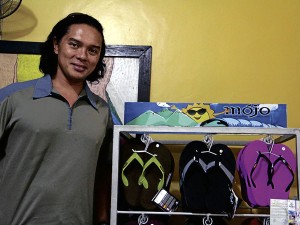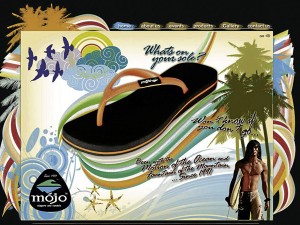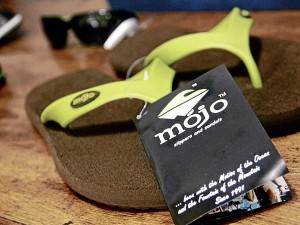Outdoorsman works on his Mojo 2 decades on
More than two decades ago, a 21-year-old outdoorsman who had just graduated from the University of the Philippines was looking for comfortable slippers to use for his frequent mountaineering activities.
From a prototype he put together with the help of a shoemaker from Marikina, Joey Cuerdo’s brand of Mojo Slippers and Sandals has grown into a company that has been the “motion of the ocean and fountain of the mountain” for outdoor enthusiasts throughout the country.
Humble beginnings
Mojo was the fruit of passion for the outdoors. When it first came out in 1991, the brand stood for flow, vibe, love and passion.
According to Cuerdo, Mojo came about because he saw that there was no footwear in the market suitable for the outdoor activities he loved to do.
“The existing local slippers and sandals were too flimsy for rugged terrain or too slippery in muddy campsites. Meanwhile, the good foreign brands were too expensive for average Pinoy students,” he says.
So he designed a pair for himself based on what he thought good outdoor footwear should be.
“My route going home passed through the Marikina area, where I would see footwear being sold. On a whim, I bought some generic supplies—sheets of rubber and cutting tools and tried to make them myself. The first pair I made was a big flop,” he laughs.
Instead of admitting defeat, he found a shoemaker in the area to execute his design. Most declined when he showed them his prototype, saying it was “too difficult to make.” Then, he came across a small shop some 15 houses down where he received a positive response.
“Let’s try making it, I’m not doing anything now,” one shoemaker responds in Filipino.
Scraping together some leftover savings from his allowance, he had a pair produced.
The first pair he had made, which had sturdy soles, good traction and adjustable straps, was for his own use. Eight of his mountaineer friends saw the sandals and wanted their own. The eight became 25 and more.
The orders came pouring in from the mountaineering and diving community. Soon, his friends were buying the durable sports sandals from him for a discounted rate of P175 a pair and selling it for the suggested retail price of P250.
The profit went towards their climbing and outdoor activities.
For five years, Mojo enjoyed 100-percent ownership of the sandal design. However, in 1996, Cuerdo’s attention was diverted to a new hobby—setting up Power Up, a chain of indoor wall climbing gyms. He could not keep up with the demand for the products.
One of Mojo’s suppliers saw the market for active footwear and started manufacturing similar designs under a different brand name. Another rival company followed suit shortly after.
“Outdoors is big business”
When Cuerdo turned his attention back to Mojo in 2006, he saw that the market for hardcore footwear was already quite vibrant.
Initially the Mojo products were produced on a per order basis and no large investment was needed to purchase any equipment.
To remain competitive, Cuerdo had to shop around for the right partners and investors.
One of the major business moves was getting a trademark for the brand and incorporating Mojo to Outward Bound Gear Inc., which provided capital.
Finished Mojo products are exclusively distributed and sold by Outward Bound Gear to major malls and retail outlets.
An average of 8,000 to 10,000 pairs of slippers is now manufactured every month.
Instead of competing head-on with the established market leaders, Cuerdo forged a different path for Mojo by developing a new line of flip-flops for a wider and mainstream audience.
“The demand for slippers and flip-flops is really big compared to the ‘hardcore’ designs from which we first started,” explains Cuerdo.
The new designs emphasizing comfort, affordability and style in vibrant summer colors, was in-line with Cuerdo’s newfound passion for surfing.
“We developed designs that were suitable for beachgoers, which was a good move, because surfing became a big hit in the country,” says Cuerdo.
The brand’s new emblem above the old trademark Mojo reflects a mountain peak and a curling wave, symbolizing Cuerdo’s love for the mountain and ocean.
From a brand that once was spread through word-of-mouth, the company has since established a good online presence through its website (www.mojosandals.com) and events.
Mojo advocates “a laid-back lifestyle of road-tripping and exploring the frontiers of Philippine scenery” and actively promotes local travel and tourism.
Cuerdo brings Mojo in through events of Power Up, which participates in various surfing festivals, kayaking events and the like.
“In 2005, there weren’t any surf resorts in La Union. We were part of their journey of becoming a top surfing destination through the events which we organized like the La Union Surfing Breaks. Mojo sandals was part of that since we were giving out free flip-flops during the events. We’ve also been partnering with the LGU in Camarines Norte for their annual Bagasbas Surfing Festival, and we’re seeing a rise in tourist arrivals there,” says Cuerdo. “The outdoors is now big business.”
Proudly Pinoy-made
While rival companies have gone abroad for cheap labor or materials, Mojo remains staunch in its advocacy of being proudly Filipino-made and providing jobs to locals.
“The lifeblood of Mojo is that everything is Filipino,” Says Cuerdo.
“All the rubber that is used for the products are sourced from rubber trees grown in the highlands of Bukidnon in Mindanao. I make sure that we don’t import any of our raw products.”
The rubber is processed locally and sent to the shoe factories in Antipolo and Marikina, in the east side of Metro Manila, providing employment to workers in one of the few shops still in operation.
Thus, the purchase of Mojo slippers and sandals directly contributes to the economy of the Philippines “every step of the way, from the rubber tree growers … to your check-in at the best beaches and mountain resorts in the country.”
Still going strong
Twenty-one years after it first started, the Mojo brand remains strong and continues to evolve.
Mojo is interested in developing the footwear into a global brand, starting with the Pacific countries.
Cuerdo says at present, there is no Filipino footwear company that has achieved the same status as internationally known brands like Havaianas or Billabong.
But despite the dream to go global, the brand remains clearly rooted in Philippine soil, showcasing the hard work and ingenuity of Filipinos and celebrating Pinoy culture.
“We’re experimenting with new footwear designs that make use of the different Pinoy weaves, including sinamay and abaca from the Bicol region, Ifugao weave from Baguio, and T’nalak from Mindanao. There’s really so much to be proud of when showcasing homegrown Pinoy products,” says Cuerdo.
photos by Kara Santos, Contributor



